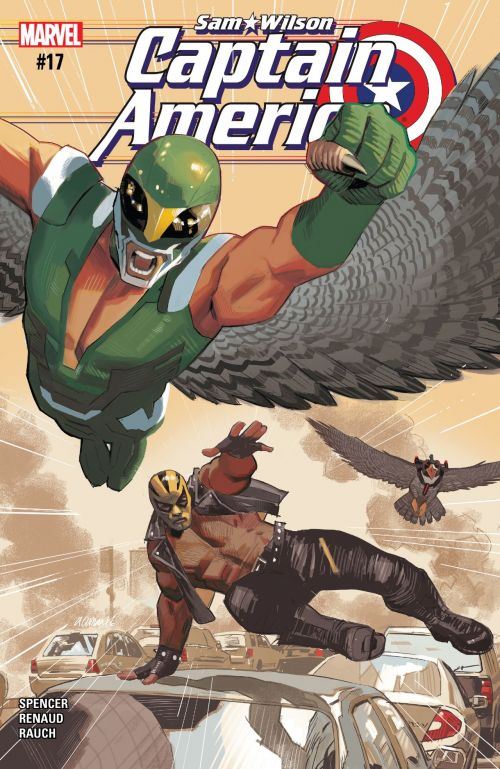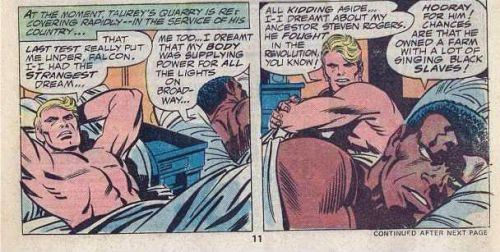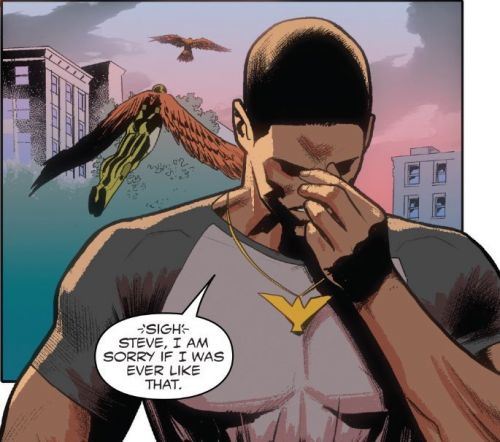Sam Wilson Captain America #17
By Hervé St-Louis
January 6, 2017 - 10:42
Marvel Comics
Writer(s): Nick Spencer
Penciller(s): Paul Renaud
Inker(s): Paul Renaud
Colourist(s): John Rauch
Letterer(s): Joe Caramagna
Cover Artist(s): Daniel Acuña
$6.10
Captain America Sam Wilson has questions about the preparedness of his new protégé, the Falcon, a Mexican-American who is at the center of a controversy and attacks by Ariella Conner, an Ann Coulter type pundit who is spreading rumours about the illegal status of the young hero. How can Captain America help his protégé chart a course where he avoids incriminating himself and playing into the hands of his right wing opponents?
This review will be political so if this is not for you please skip to the review section of the article entirely. It is also political though. There will also be spoilers.
 |
The Politics
Where do I start? My review of this comic could be considered a political act as it was borne from a protest started on Twitter. Reviewing this comic is for me breaking a decision I made in 2016 to stop paying attention to Marvel Comics, buying and reading them. But my decision has made people who do not know me attack me personally. I am the publisher of ComicBookBin and I did promise Nick Spencer, the writer of this comic, a fair review and I will, regardless of other people’s attack on my person.
Let’s start with the controversy. Blogger Makalesi Moore argued that Spencer portrayed Sam Wilson (a black man) as apologizing to a white man (Captain America) for using activist language early in his career. Moore took issue with Spencer accusing the writer (a white man) of writing a fantasy scene that portrayed his personal politics, that of Blacks recognizing that their activism in favour of racial equality was an error.
I became interested in this small controversy because I dislike the way Marvel Comics has handled its integration of gender and racial minorities in its comics. Marvel Comic has no real commitment to diversity in that its characters have been forcibly changed but the stories are still written by the same old creators such as Spencer. When recruiting minorities, they are often assigned books with similar minority characters. These characters appear to be upstaging the old white men of the Marvel universe, have no support from a vocal cross section of comic readers while failing to recruit new readers to take their place.
Marvel does not know how to do inclusive comics. If its comics were inclusive, the very stories would change from the traditional male bravado and big universe event to something else whatever that is. Marvel Comics likes to boast but it’s not very good with following things up. ComicBookBin, a Canadian comics news and review site was established way back in 2002, before 95% of similar sites. Marvel has officially ignored us since 2008, when its then publicist (who now works for the Sci-Fi channel) asked his colleagues to boycott us.
Still ComicBookBin continued to review Marvel Comics even though we were persona non grata. Marvel Comics are also overpriced. It cost me $6.10 Canadian to buy this comic book. In 2016, I decided to stop buying Marvel Comics entirely because of its ill-fated approach to representation and borderline racism. I also got tired of the reboots and events. There are other comics out there to focus on.
Marvel has never sent a review copy to ComicBookBin. DC Comics, Image, Valiant, IDW, Darkhorse, TopShelf, NBM, Boom, Viz, Archie, and hundreds of other publishers have sent ComicBookBin review material since 2002. Even Disney, Marvel Comics’ parent company has treat us well, with exclusive previews of games, interviews with talents, professional communications, and review copies of material. Before October 2008, Marvel only sent us press releases so that we would hype its books.
The staff at ComicBookBin is free to review Marvel Comic regardless of my personal views. There are many articles at ComicBookBin that I disagree with, yet I will not censor them. ComicBookBin has always protected the freedom of its writers. I do not dictate their views and choices. Yet, few Bin writers care about Marvel Comics. I invited Nick Spencer to send me a review copy of Captain America. He ignored my request, but that was to be expected. Marvel dislikes ComicBookBin.
My decision to request a comic from Spencer drew the ire of Makalesi Moore who considered me a traitor to Blacks. I was called manipulative, rude, and the expression giving blow job slipped in the attacks. I’m hoping that I’ll be called an Uncle Tom at some point. That would make my day. All of this happened without me even knowing as I was blocked or under attack by Moore while I went on with my day. I only realized that some drama was occurring when I came back from the comic book store with a copy of Captain America #17 eight hours later. A friend, not involved in this debate retweeted to me Moore’s original complaint, knowing that I might be interested in covering this. She had no dealings or interactions with Moore. Yet she was also blocked. Her crime; associating with me.
The one person that was not blocked was Bedside Press publisher Hope Nicholson who was tagged in the conversations. Moore wouldn’t dare burn bridges with an independent publisher who might publish her work one day… Moore also went on a rant arguing that it was somehow wrong to retweet or tag someone on Twitter without asking their permission to do so.
Dear Makalesi Moore, if you want to stop people from tagging you or retweeting you, you must enable the protected account option on Twitter. Then, no one will be able to retweet your words, or interact with you directly. Do not expect people to ask your permission before tagging you or retweeting your posts. You cannot dictate how people will use Twitter. Your Twitter account is not a right. It is a privilege. Twitter, unlike Facebook is an open social network, where anyone on the platform can interact with anyone else. If you don’t like this feature about Twitter, then please leave the platform.
You cannot dictate to me or anyone else what is proper “Black” behaviour either. All Blacks do not share one single mind. Blacks have a diversity of positions and experiences. Neither can you dictate other people’s behaviour. Everyone has their own agency. You cannot expect anyone online to behave the way you want or agree with you. Insulting them and accusing them of performing blow jobs on Nick Spencer says a lot about your character.
As the publisher of ComicBookBin, I am doing my job when I request review material and when I tell creators that I will review their books fairly. Regardless of controversies, it is my responsibility as a professional reviewer to treat people’s work fairly. While you think that you can school me about providing critiques from a black perspective, you have not bothered to check my work and road map.
You also have not bothered to read the bloody comic before making an opinion about its merit. Whether I get a free copy or not, I cannot talk about a comic, especially one with such controversies without having done my due diligence. That’s why I’m a professional and not focused on building a large Twitter following like you. I take the critique of comics and cultural issues seriously. You do not.
The Review
It was a painful comic to read. Spencer’s job is to brave the cultural flames while trying to write a traditional comic book that follows a specific storytelling structure. There is an introduction, a conflict, a climax and then a conclusion. But because of the sequential nature of monthly comics, there is also a cliffhanger. In that every structured storytelling frame, Spencer has to imbue his comics with just enough politics to get readers and opponents to complain or support the comic.
Spencer has to dumb down the comic while trying to make it socially relevant and a commentary on American cultural wars. This is the same formula that I noticed when I reviewed the first issue of Captain America comic featuring Steve Rogers, months ago. Everything becomes a caricature of complex debates. This is after all, written for teens.
So Spencer writes a mockery of so-called social justice warriors and creates a clone of Ann Coulter in order to pick on both sides of America. His job is to straddle the middle and try to chart some sense. And Sam Wilson is really playing Spencer’s role here. Spencer has been attacked by right wing readers for going too far with his criticisms of conservatives. And as with the case of Makalesi Moore, Spencer gets similar criticisms from so-called left-leaning readers. Straddling the middle is supposed to be a game where the joke is on everyone. Spencer is trying to show how feeble and pointless all of the infighting in America is.
And here, Sam Wilson is the lucid one trying to keep everything from exploding. At the end of the issue, Rage and the new Falcon both come to realize how narrow Sam Wilson’s course of action is. They have a responsibility to follow a similar path if they want to help as many people as possible but they begrudgingly refuse to. But Sam Wilson knows that they will come around, eventually. They have to. They are heroes and with great powers, come great responsibility. Typical Marvel story.
Comic readers like Makalesi Moore reject the Captain America that Spencer presents. They reject his role and how as the straight guy in the lunatic house, he doesn’t have the freedom to be the jiving and critical character that he was when written by Jack Kirby. Much of the criticism was described as the neutering of Sam Wilson. Spencer was accused of making him acceptable to right wingers and others who dislike the character. Let’s just say that the only acceptable Sam Wilson that Spencer can write that will please right wingers is one where he’s dead. Spencer is not trying to please right wingers with his take on Sam Wilson.
Wilson here, is playing the role of an Obama like figure. He has roots from edgy and critical black America. Yet his current role is that of one of service to all Americans. He’s not as edgy as he used to be and it would be an error to think that when Sam Wilson was the Falcon, that he was always counter current. While Jack Kirby may have written him well, Steve Englehart and other writers made Sam Wilson an angry black guy imbued with the worst stereotypes of resistance to whites. He was not a character but a role.
And when he was not the angry black man, outside of Jack Kirby, he was just another bland Avenger who could fly and who was not very useful. Spencer is making a claim that Sam Wilson has changed since his early days and his apology to Steve Rogers is an actual monologue. Steve Rogers is nowhere near Wilson when he makes that comment.
 |
| I don't know when this comic was originally published. If you have this information, please share it with me. |
Arguing that a black man cannot be critical of his past is arguing that the character cannot change and evolve. And if the writer of this comic cannot write a character that changes, then what’s the point of using him as Captain America? Rage and the new Falcon play the very role that Sam Wilson played decades ago. In the Jack Kirby comics, Captain America was not portrayed as the all-knowing white guy. He was the clueless white guy who was changed by Sam Wilson.
But Sam Wilson here is not clueless. He acknowledged that with age, he has become complacent and that the kids have forced him out of his newfound comfort zone. To accuse Spencer of writing a racist comic is exaggerating. Spencer is somewhat liberal. His comic is over the top. But it’s fair to say that he’s been the victim of character assassination. And it will not stop. Writing this, by the way, I also condemn myself as a traitor with Blacks and some will say that I am trying to suck up to Spencer.
The part of the comic that did annoy me were the social justice warriors who were willing to kill Ariella Conner and showed no remorse. Their counterparts are the right wing enforcers called the Americops. With the social justice warriors, the likes of Makalesi Moore have a point. The term social justice warrior is a derogatory term used by opponents of civil rights advocates. Spencer could not resist the opportunity to play with these toys and he did. That was a lack of judgment and made fun of a lot of activists’ attempt to force creeps like Ann Coulter to respect people’s dignity.
Social justice is but an extension of the traditional rights that were once only attributed to a propertied minority in Western societies. Voting rights, property rights, democracy, liberty, and fraternity were once rights that were the exclusive purview of a minority, usually white males. In the United States, movements like the Civil Rights, women’s rights, anti-Vietnam protests, gay rights in the 1970s sought to expand these rights which nominally were shared by all, but in practice were not.
Social justice today is about fighting for the rights of disabled people, women, LGBT people, and racial minorities. There is a regression and a push to question basic rights of people used by right wingers and an attempt to normalized racism, misogyny, and other attacks on people’s rights. Critics who dislike social justice resort to keywords to hide what they really mean. They refer to requests for decent and respectful public discourse as political correctness, as well as derogatory terms like social justice warriors.
Nick Spencer did not reflect this in his comic and thus made a mockery of legitimate demands for human dignity. This is consistent with the overall immaturity of the comic which tries to deal with large cultural themes but only does superficially. In doing so he plays into what scholar Jodi Dean calls communicative capitalism. He adds nothing to an ongoing societal debate but does provide a distraction from the real problems happening in American society.
 |
A better writer would have played with the same toys but created something that really was critical of the American cultural wars. If you cannot play with all the toys because the structure of the comic that you are writing for or your skill sets are limited, then do what I tell my undergraduate students all the time. Take one position when debating issues. Don’t try to play the reporter’s game of covering the same issue from all angles giving equal voice to all sides. You can’t have it both ways and mock everyone at once, unless you have the skills to do so, and can sustain that one position effectively.
I do not know French artist Paul Renaud but I’m glad to have seen his work here. He is a mature comic book artist that has been published in Europe. His influences are mostly American cartoonists. His contribution is the best thing about this comic. He’s got a good handle on anatomy overall and very fine storytelling skills. The story flows well, regardless of the overwritten captions. A few panels are a bit odd, like the top left one on page eight where Rage looks the other way. It’s an odd composition.
The weakness of this comic is the colouring. John Paul uses a monotone colour set that does not allow the beautiful art to jump off the page. Everything looks moody. Even in daylight scenes, the colourist adds a filter on all of the illustrations meaning it’s not possible to have a neutral colour in this comic. The filters are too overbearing.
I also need to mention that a comic that features black characters prominently should not be plagued with the black palms problem, where colourists draw the palms of Blacks the same colour as the rest of their skin. This usually betrays a colourist who has little clue about how people look in real life and has not spent much time observing the world. In Sam Wilson Captain America, this is not just an oversight, it’s bad design.
Rating: 6/10
Related Articles:
Captain America Series 1 Marvel Legends Review
Hail Hydra Captain America Kitbash
Marvel Legends (Toybiz) Series 8 Classic Captain America (2004)
Captain America John F. Walker
Captain America First Avenger
Gamerverse Stealth Captain America
VIZ Media Announces "Captain Tsubasa" on Cartoon Network Latin America
Generations: Sam Wilson Captain America & Steve Rogers Captain America #1 comics review
Sam Wilson Captain America #17
Steve Rogers: Captain America #1
